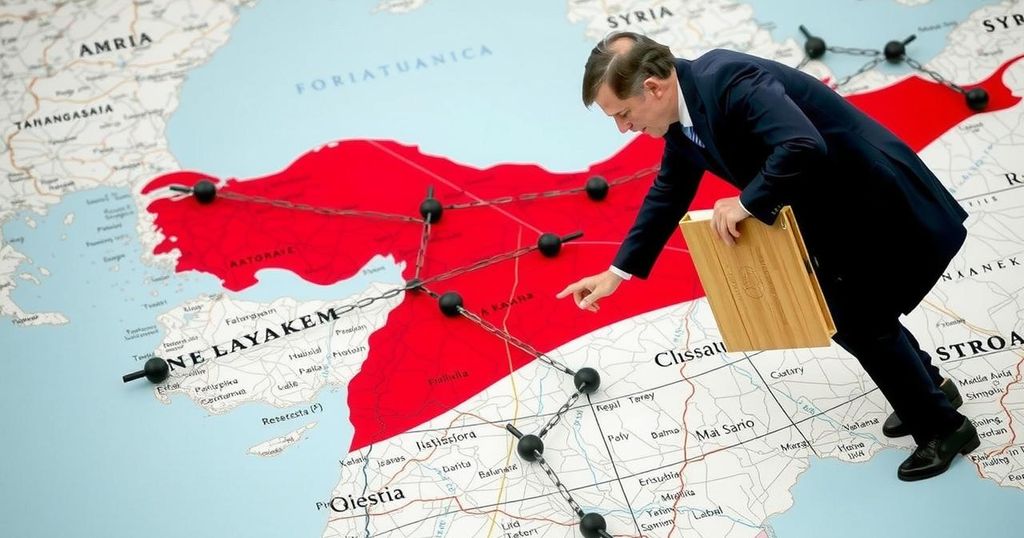Turkey’s Strategic Gains in Post-Assad Syria: Erdoğan’s Diplomatic Maneuvering

Turkey has rapidly re-established its presence in Syria following the exit of Bashar al-Assad, with Turkish officials engaging with Syrian leadership. This move is seen as a validation of President Erdoğan’s strategies. Amidst shifting power dynamics, Erdogan faces domestic balancing acts regarding Syrian refugees, while enhancing Turkey’s regional influence and reconstruction efforts.
In the aftermath of Bashar al-Assad’s departure from Syria, Turkey has swiftly established its diplomatic presence in Damascus, marking a significant shift in its foreign policy strategy. Turkish officials, led by intelligence chief Ibrahim Kalin, have engaged with key figures in Syria’s new leadership, underscoring Ankara’s newfound influence in the region. According to Dareen Khalifa of the International Crisis Group, this development represents a significant victory for Turkey, validating President Erdoğan’s strategic maneuvers in the Syrian conflict.
Erdoğan’s approach involved a calculated delay in supporting the rebel group Hayat Tahrir al-Sham (HTS) until the political landscape settled post-Assad. Despite initial uncertainty regarding HTS’s intentions, Turkey ultimately permitted an offensive against Assad’s regime, which unexpectedly resulted in a rapid advance by the insurgents. Gönül Tol from the Middle East Institute describes this turn of events as a “catastrophic success” for Ankara, providing Erdoğan with new opportunities both in foreign policy and domestic politics, particularly concerning the sensitive issue of Syrian refugees.
The fall of Assad offers Erdoğan a platform to enhance his image as a protector of Syrians while simultaneously addressing nationalist pressures to repatriate refugees residing in Turkey. Within days of Assad’s departure, Turkish foreign minister Hakan Fidan indicated the intention for refugees to return, and construction companies showed renewed optimism regarding Syria’s reconstruction.
As Turkey is also engaging with Kurdish groups, there is a notable shift in the power dynamics across northern Syria. Khalifa notes the absence of significant media coverage surrounding the recent capture of territories by Turkish-backed forces, asserting that Ankara is adeptly maneuvering to expand its influence without much resistance. At a recent conference, Fidan reiterated Turkey’s position of supporting legitimate Kurdish representation solely within the context of the new Syrian government, ensuring that no autonomous Kurdish state emerges in northeastern Syria.
While the road ahead may present certain risks, Turkey’s proactive stance positions it favorably towards leveraging its influence in the post-Assad landscape effectively. Moving forward, Turkey is poised to play a crucial role in Syria’s reconstruction and stabilization efforts, leveraging its strategic partnerships for broader regional control.
The recent political changes in Syria following the ousting of Bashar al-Assad have stirred a complex interplay of regional powers, particularly Turkey. Historically, Turkey has maintained a wavering position in the Syrian conflict, largely influenced by its concerns over Kurdish autonomy and its approach towards Syrian refugees. The shift in leadership in Damascus allows Turkey to recalibrate its strategies, enhancing its leverage in negotiations and power dynamics within the region. In light of these developments, Turkey’s diplomatic engagement in Syria signifies a pivotal moment for its foreign policy and regional ambitions.
The recent developments in Syria post-Assad’s departure present Turkey with a unique opportunity to assert its influence and redefine its role in the region. As Ankara secures its position alongside new Syrian leadership, it must navigate the complexities of Kurdish relations and the managing of Syrian refugees, all while striving for strategic gains in reconstruction and political stabilization efforts. The unfolding situation underscores Turkey’s dynamic capacity to adapt and shape outcomes in a rapidly changing geopolitical landscape.
Original Source: www.theguardian.com






